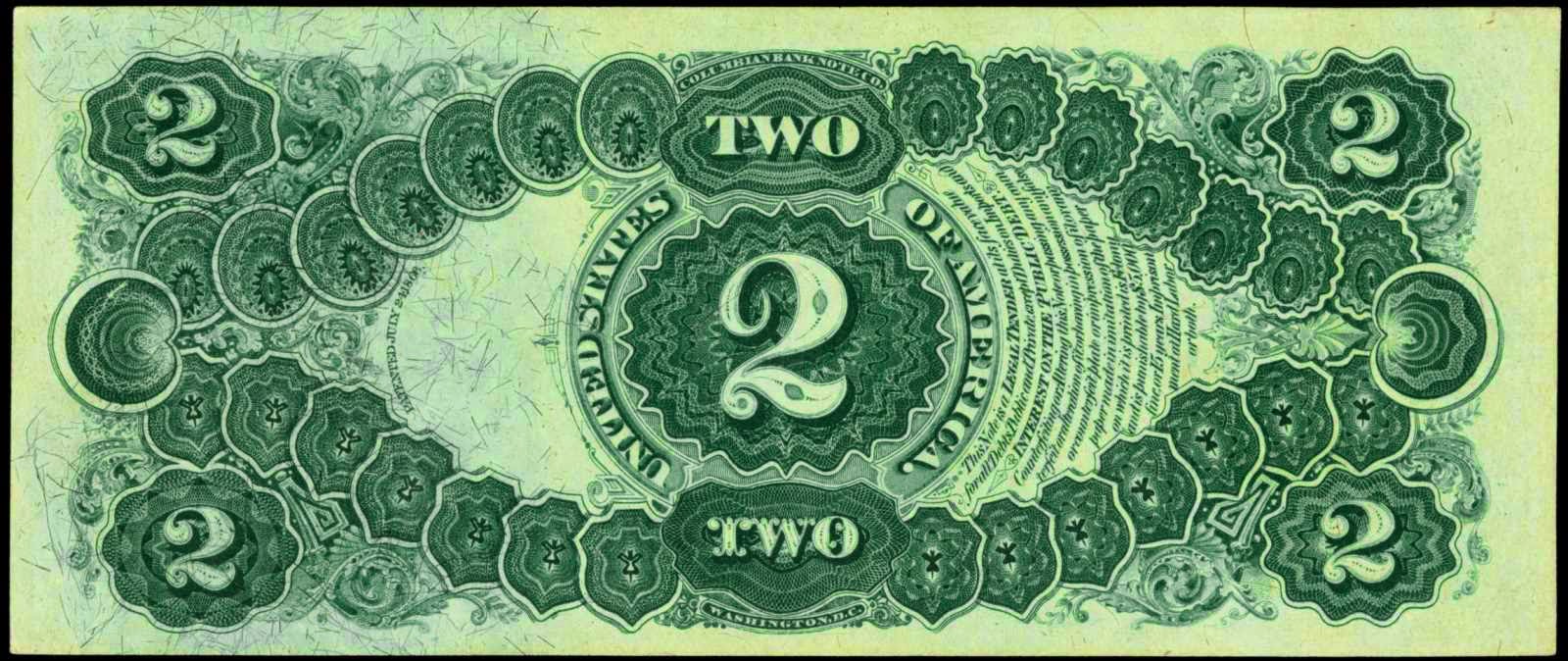 |
| Two Dollar Bill From Series of 1875 Legal Tender / United States Note |
 |
| 1875 $2 Legal Tender Note Series "B" |
United States Notes - 1875 Two Dollar Legal Tender Note “Bracelet Reverse”
Obverse: Bust of Thomas Jefferson, third President of the United States, 1801-1805. The portrait was engraved by James Smillie. At center, a view of the Capitol.
Reverse: The “bracelet reverse.”
Signatures: (as depicted) John Allison, Register of the Treasury and John Chalfant New, Treasurer of the United States.Inscriptions: Act of March 3rd 1863 - Engraved & Printed at the Bureau Engraving & Printing - Patented July 24th 1866 - C.W. Casilear's Patent Nov. 24 1868 - Register Of The Treasury - Treasurer Of The United States - This Note Is A Legal Tender For Two Dollars - Series of 1875 - The United States Will Pay To Bearer Two Dollars Washington D.C. - United States Note - Amer Septent Sigil Thesaur - Columbian Bank Note Co. - United States of America - This Note is a Legal Tender at its face value for all debts public and private, except duties on imports and interest on the public debt. Counterfeiting or altering this note or passing any counterfeit or alteration of it, or having in possession any false or counterfeit plate or impression of it, or any paper made in imitation of the paper on which it is printed is felony, and is punishable by $5,000 fine, or 15 years imprisonment at hard labor or both.
United States 2 Dollar Bills
United States 2 Dollar Bill, Legal Tender Note “Bracelet Reverse”, Series 1875
John Chalfant New, 11th Treasurer of the United States
John Chalfant New (July 6, 1831 – June 4, 1906) was a United States banker and lawyer who held a variety of government positions. He was Treasurer of the United States from 1875 to 1876.
John C. New was born on July 6, 1831 in Vernon, Indiana. His father was John Bowman New, son of Jethro New, and his mother was Mariah (Chalfant) New. His brother was Jeptha D. New. He was educated at Bethany College, studying law and graduating in 1851.
After college, New worked as a banker, publisher, and lawyer. He married Melissa Beeler in 1854; together the two had a son, Harry Stewart New, born in 1858.
Following the resignation of Horatio C. Newcomb from his seat in the Indiana Senate, New was elected to Newcomb's former seat in 1863.
His first wife died in 1867 and he remarried to Elizabeth R. McRae, and the couple had two children together. She was born in Louisiana on 4 February 1845 and died in Indianapolis on 19 February 1935.
In 1875, President of the United States Ulysses S. Grant nominated New to be Treasurer of the United States, and New subsequently held that office from June 30, 1875 to July 1, 1876. In 1880, John New purchased the Indianapolis Journal, and also became chairman of the Indiana Republican Party. In this position he gathered enough power to be called the "boss of Indiana Republican politics."
As the leader of the Indiana delegation to the Republican National Convention held in Chicago in June 1880, New led the Indiana delegation in casting 26 of Indiana's 30 delegate votes for James G. Blaine. However, Blaine did not win the nomination on the first ballot at the Chicago Convention. Nor did Blaine or anyone else gather enough delegates to win the nomination for the thirty-three ballots as the convention dragged on in search of a nominee. Finally, on the 34th ballot, Wisconsin cast 16 delegate votes in favor of James A. Garfield, a "dark horse" candidate. Immediately, on the 35th ballot, James New and future President Benjamin Harrison brought 27 of the 30 Indiana delegates over to Garfield, starting a stampede at the convention that ended in the nomination of James A. Garfield as the Republican nominee for President.
In 1882, John New was again elected chairman of the Indiana Republican Party. He continued to serve in this position until he was appointed the First Assistant Secretary of the Treasury, a position he held from 1882 to 1883. New also served as U.S. consul general in London from 1889 to 1893.
New died in Indianapolis on June 4, 1906.